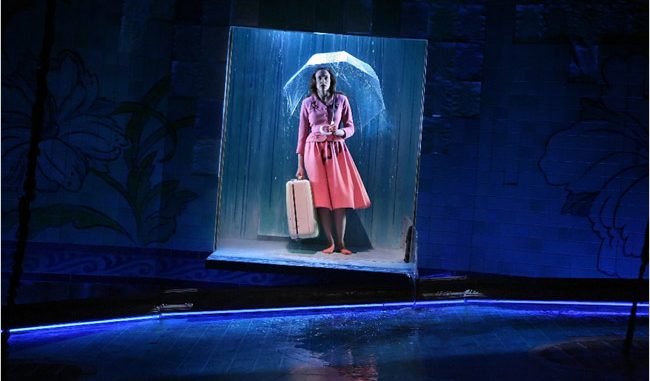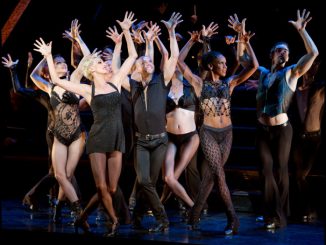
David Anderson, Staff Writer |
SUNY Oneonta’s Mask and Hammer Theatre Club put on a production of Sarah Ruhl’s “Eurydice” March 23-25. Written in 2003, Ruhl’s “Eurydice” is a modern retelling of the Orpheus myth with a focus on his wife. In the original Greek myth, Orpheus and Eurydice are a happily married couple until Eurydice is bitten by a snake and dies instantly. Overcome by grief, Orpheus descends into the underworld and makes a deal with Hades that if he can walk through the underworld, looking straight ahead, Eurydice will follow him and, as long as he never looks back, she will return with him into the land of the living. Ultimately, Orpheus succumbs to temptation and turns around, losing Eurydice forever.
In Ruhl’s rewriting of the myth, Eurydice is reunited with her father in the underworld and the play largely focuses on the rekindling of their relationship. Initially, Eurydice does not recognize her father. Every person who enters the underworld has to be dipped in the river Lethe, which makes one forget everything from the world of the living. However, Eurydice’s father is an exception to this rule; he remembers how to read and write, as well as his daughter and her husband. When the two are reunited, he gradually re-teaches her the language of the living.
Beyond the touching emphasis on a daughter’s relationship with her father, Ruhl’s retelling also places substantial emphasis on the arts of music and literature as preserving human attachment. In both the myth and in Ruhl’s retelling, Orpheus is an exceptional musician and it is his artistic prowess that lets him enter the underworld unscathed. It is not his love alone that allows him to (nearly) reclaim his wife, it is eloquent expression of his love into music that permits him to do so. Furthermore, it is language that gives Eurydice and her father the chance to reconnect. Eurydice’s memory does not return after her father recounts his happy moments with her, instead she remembers him when he teaches her the word “father.” It is language that revitalizes her memory and her past relations. In this way, the play is not just a creative shift in perception, it is also a poignant assertion of the arts as a necessity to preserve human companionship.
However, the Mask and Hammer Theatre Club went so far as to add another layer to this already dense play. In their production, Orpheus is cast as a woman, and while the focus of the play still remains on Eurydice and her father, the casting of Eurydice and Orpheus as lesbians puts a new spin on the play’s comments on marital relationships.
Two characters attempt to seduce Eurydice throughout the play, an “Interesting Man” and the Lord of the Underworld, both played by Kristen Goodwin. In both cases, the rhetoric is nearly the same. Both characters claim that Orpheus cannot take care of Eurydice like a real man could and that her relationship is artificial because of it.
In the original version, where Orpheus is a man, these comments perpetuate a kind of male paternalism in heterosexual relationships and function to infantilize Eurydice and castrate Orpheus. However, in this case where Eurydice and Orpheus are lesbians, the attempted seductions and their claims about a necessary masculinity function instead as an invalidation of lesbian relationships altogether. In Ruhl’s original story, Eurydice and Orpheus are victimized by those seeking to perpetuate a male-female binary. In this casting, Eurydice and Orpheus are victimized by those who believe that their relationship was never valid in the first place and can only be validated by the forced inclusion of a masculine presence.
Directed by Kenneth Schick and featuring the talents of Briana Powers as Eurydice, James Blydenburgh as The Father, Lauren Mehling as Orpheus, Kristen Goodwin as the “Interesting Man” and the Lord of the Underworld, and Irmani Jones, Danielle Swierczyna, and Leslie Sawyer as A Chorus of Stones, this production of Eurydice made a powerful and moving statement regarding ones parental relationships, art, and heterosexual hegemony.

Leave a Reply